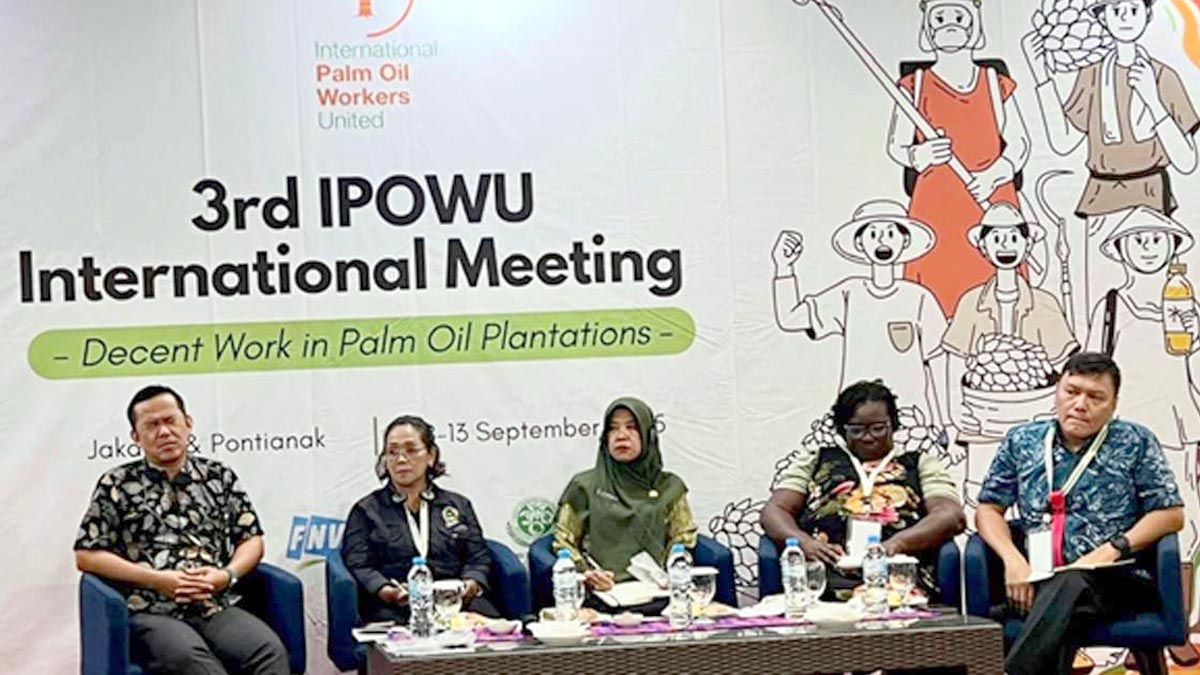PALMOILMAGAZINE, PONTIANAK — Behind the palm oil industry that drives West Kalimantan’s economy, a harsher reality continues to shadow hundreds of thousands of plantation workers, particularly women. A Multi-Stakeholder Forum titled “Decent Work in Palm Oil Plantations” held in Pontianak on Friday (Sept 12) revealed that labor protection in the sector remains far from adequate.
According to Heronimus Hero, Head of the West Kalimantan Plantation and Livestock Agency, more than 150,000 people in the province are employed in palm oil. “The industry faces serious welfare issues. Revenue-sharing funds from palm oil are allocated to social security and scholarships for farmers’ children. Still, companies must also ensure proper training for workers, especially on the safe handling of agrochemicals,” he stated in an official note received by Palmoilmagazine.com on Sunday (Sept 14, 2025).
Yet, the workers’ voices tell another story. Yublina Oematan, a women workers’ activist, stressed that the majority of palm oil laborers remain classified as daily casual workers (BHL) or piece-rate workers (BHB). “After more than a decade of work, their status never changes. Wages remain unequal compared to men’s. Women workers face higher risks—from skin irritation and infertility to cancer due to toxic exposure,” she said.
Also Read: Indonesia Strengthens Trade Ties with India, Palm Oil Remains Key Export
This concern was echoed by Ismet Inoni, Coordinator of the Palm Oil Workers Coalition, who stated that the principle of decent work has not been met. “Most palm oil workers are women, yet they are left unprotected from chemical exposure. They are the most vulnerable,” he stressed. Occupational safety expert Dr. Naura Zainar Aufaira added that agrochemical exposure poses severe health risks for pregnant women, including miscarriages and birth defects.
In West Kalimantan, palm oil plantations span 3.2 million hectares—around 22% of the province’s total land area—and serve as the livelihood for millions. However, Ahmad Syukri, Director of LinkAR Borneo, warned that corporate profits must not come at the cost of workers’ suffering. “Low wages, insecure employment status, and weak occupational safety protections remain pressing issues. Government, employers, and unions must prioritize these challenges to ensure a just transition in the palm oil sector,” he urged.
The forum emphasized that decent work in plantations cannot remain a slogan. Current regulations, including the Omnibus Law on Job Creation, are seen as insufficient to safeguard workers. Stakeholders are pushing local governments and legislatures to establish regional bylaws specifically for palm oil labor, along with clear SOPs and collective agreements that ensure women’s participation. Without such measures, palm oil will continue to be viewed merely as a foreign exchange machine—rather than an ecosystem that guarantees justice and welfare for its workers. (P2)
